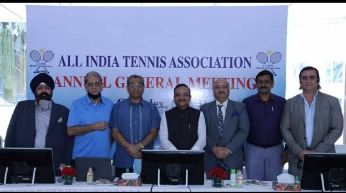NEW DELHI, Sept 3, 2020 /PRNewswire/ — Noble Laureate Muhammad Yunus in conversation with Dr. Aseem Chauhan, appealed to make corona vaccine a public common good and shared his insight on creating social businesses in the post-COVID world. The laureate in an hour-long webinar hosted by YSBC and moderated by Dr. Aseem shed light on various social issues that the world needs to tackle after the pandemic. The webinar was attended by many eminent personalities from all over the world and students from Amity University.
Link to the Webinar : https://www.youtube.com/watch?v=c9tbYXH8S0Y&feature=youtu.be&fbclid=IwAR31MzhopZDF6Q5oOcpib08zD_a6atIdk4cvWFatzOJj6PV1CeoKP2H8Hps
Prof. Yunus, who won the Nobel Peace Prize in 2006 called to make the coronavirus vaccine a public common good. He further added, the governments should come together and present a resolution to make the vaccine solely for the people so that all can get an access to it. With Dr. Aseem Chauhan asking about how this pandemic should be treated as chance to recreate the past, Prof. Yunus replied by urging the world to take this pandemic as an opportunity to introspect and should not go back to the ways of the old world. He said, “We all were in a train that was leading us to our destruction, but the pandemic has stopped it and given us time to rethink our ways.” He envisioned a world of three zeroes; Zero net carbon emissions, Zero wealth concentration and Zero unemployment.
He remarked how the pandemic has revealed all the weaknesses of the world bringing half of its population struggling for survival. “The plight of migrants, massive unemployment and the paralysis of the informal sector are all a proof of how we have failed as a society.”
Initiating the discussion about encouraging social business by Dr. Chauhan, Prof. Yunus was hopeful that the world will be eager to join such a noble cause and how, many organizations have already taken the step in their own capacities. He called for the creation of a social business pharmaceutical company for the benefit of people and society at large. He stressed to create checkposts and make tough decisions. The world needs more thought leaders and a collective conscience.
Towards the end, Dr. Aseem Chauhan encouraged the young students to take away the methods and ways suggested by Muhammad Yunus in his optimistic vision to make a new world. He hoped that more and more people to come forward to share his ideology and keep getting inspiration from the laureate’s work and thoughts.
Amity Univerisity along with Yunus Social Business Center is contributing towards the research, teaching and training endeavors to create awareness about the concept of Social Business. At Amity, there are two Yunus Social Business Centers at Jaipur and Gurugram currently. Both the centres have been doing excellent work at grassroot level such as providing financial literacy and financial management workshops, skill development, low cost technological solutions and entrepreneurship support to the youth in rural areas and many more Yunus Social Business Centres are planned across Amity campuses around the world.
About Amity University Gurugram:
Amity University Gurugram is built on a foundation that embodies all the qualities that have made Amity institutions world-class over the last two decades. It has instituted global standards in education, training, and research with state-of-the-art infrastructure and the latest teaching methodologies. With an industry-integrated curriculum, the University trains future leaders of the corporate world by blending modernity with tradition in each of its students. Situated in the picturesque, 110-acre Amity Education Valley, in the close proximity of Gurugram, one of India’s biggest corporate hubs. The university has over 150 UGC recognized UG and PG courses, 1,000 + faculty and scientist, 1040 patents filed, by the faculty of Amity group over the last years and 20 Inter-disciplinary research centers. The campus provides a multicultural environment with the presence of students from across India and more than 15 countries, who share the diversity of regions, ethnicities, flavors, and cuisines giving the campuses a global outlook.
(Disclaimer–Features may vary depending on the regions; subject to change without notice.)














